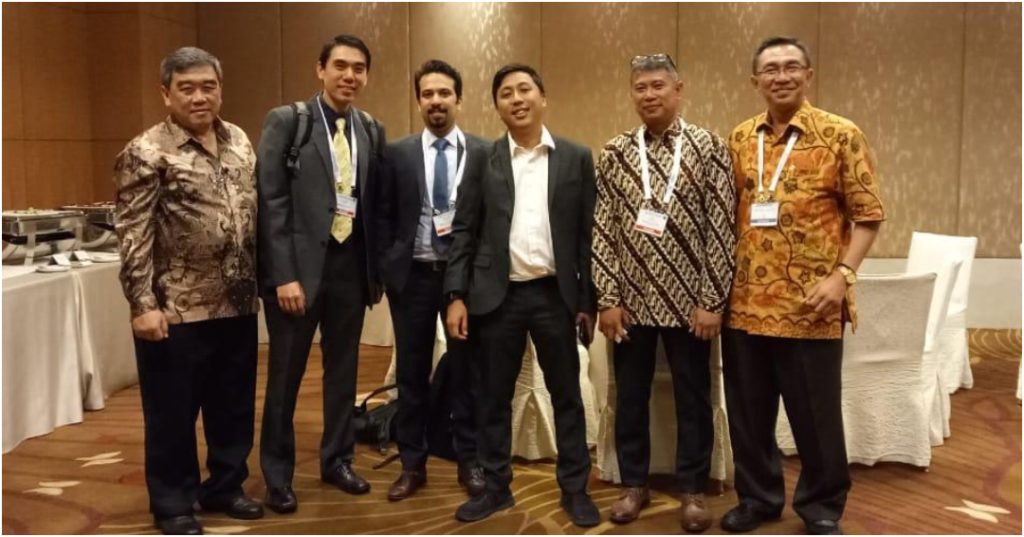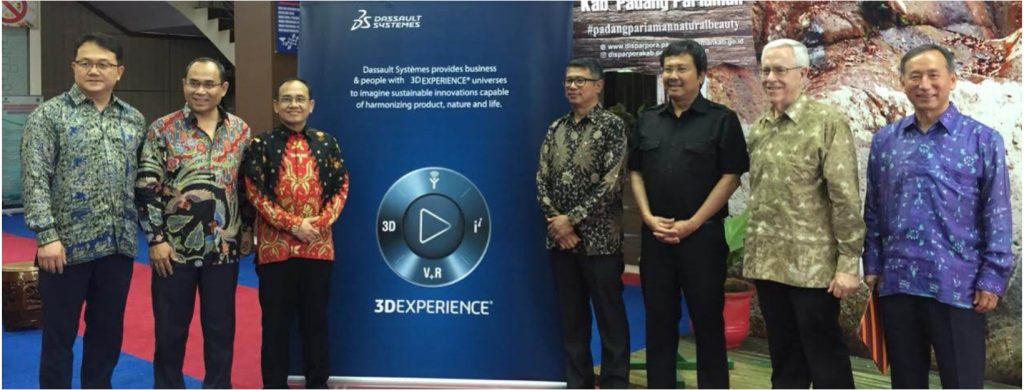
During the GovPay | GovNext Summit in Jakarta on 22 January 2019, Guest-of-Honour, Dr. Bambang Brodjonegoro, Minister of National Development Planning, Indonesia, spoke at length on Indonesia’s Innovation Vision, where he touched on the “Triple Helix” model that will facilitate the planning and implementation of the government’s “Making Indonesia 4.0” roadmap. “Triple Helix” refers to close collaboration amongst three key stakeholders – academics, businesses and local governments.
This is where Public-Private Partnerships, or PPP, can contribute meaningfully to the “Triple Helix” model. PPP, or 3P, is a term referring to cooperative arrangements between two or more public and private sector entities in infrastructure development.
Adi Aviantoro, Dassault Systèmes’ Indonesia Business Leader, Value Solutions, Asia Pacific South, was a moderator at the Roundtable Session on PPP, where he discussed how PPP in Indonesia can leverage technology derived from global knowledge and know-how in innovation, in order to provide transparency and clarity across private sector partners to local governments, for better management of PPP projects.
Roundtable Session: Public-Private Partnerships (PPP)

Speakers:
- Adi Aviantoro, Indonesia Country Business Leader, Value Solutions, Asia Pacific South, Dassault Systèmes (Moderator)
- Eddy Satriya, Deputy Assistant for Telematics and Utilities, Coordinating Ministry for Economic Affairs
- Kyong-yul Lee, Secretary General, World Smart Sustainable Cities Organisation
- Charles Phua Chao Rong, Chairman, Solaris Consortium of Management Consultancies
The Indonesian government launched its “Making Indonesia 4.0” roadmap in April 2018, which aspires to develop Indonesia into one of the top 10 largest economies in the world by 2030. A critical part of the “Making Indonesia 4.0” masterplan is to develop 100 smart cities as urban populations grow rapidly, usage of digital technologies become endemic and demand rises for modern and sustainable infrastructure that effectively utilizes information and communication technologies (ICT). PPP can be a powerful conduit in realizing this aspiration.
At the same time, Indonesia is a large and highly diverse country. Each region possesses its own local characteristics and can be at vastly different stages of urbanization from Indonesia’s main city centres, such as Jakarta. Importantly, the educational and skills levels of people in each region, as well as internet penetration and mobile phone usage, vary massively. Infrastructure development has to take into account each of these unique requirements.
Building of ‘smart cities’ in Indonesia should be more than just a “catch up game” in global technology, and much more than just providing 4G broadband internet access in a region. It is about building livable and sustainable cities for the comfort of Indonesian citizens. It is about building resilience in Indonesian cities for citizens living in seismically active zones to better withstand and respond promptly and decisively to natural calamities.
In recent years, PPP has become an increasing trend for infrastructure projects in ASEAN countries. . According to estimates by the Asian Development Bank (ADB), infrastructure-financing needs for ASEAN members is estimated at around $210 billion per year when taking into account climate change mitigation and adaptation costs (ref: “Green and Blue Finance Will Help Bridge Infrastructure Investment Gap in Southeast Asia”, 15 February 2019, Asian Development Bank news release).
Government partnerships with private sector companies for PPP-led infrastructure development can help to increase funding availability for much-needed infrastructure in ASEAN countries, such as Indonesia.
PPP arrangements are typically long-term and involve large private multi-national corporations. In a PPP contract for an infrastructure project, the onus will be on the private partner to attain ROI (return on investment) to answer to its shareholders, especially if it is listed. As the private partner’s motivation is ROI, the result is potentially faster project completions and reduced delays on infrastructure projects, as time-to-completion is an important measure of performance to the private partner. Private partners can also potentially introduce more innovations and operational efficiency practices to infrastructure projects, to achieve time-to-completion or even early completion performance that will influence ROI. The PPP partnership also enables the private partner to share risks and responsibilities with the local government.
For local businesses, PPPs can be an effective way of developing their capabilities, as they learn to work with new technologies and management practices brought to the PPP-led infrastructure project by large international firms. Local businesses can also benefit from sub-contracting opportunities in areas such as electrical works, facilities management, security services, cleaning and maintenance, which naturally come with an infrastructure project.
Small-scale infrastructure projects are also a possibility through PPP

It is not always necessary to develop big-ticket infrastructure projects to make a ‘smart city’. Small-scale infrastructure projects through PPP can be economically viable, and if planned well, can facilitate economic growth, job creation and improved public service systems.
As an example of a successful small-scale PPP-led infrastructure project, Dassault Systèmes in Indonesia is supporting the Padang Pariaman Regency with their digital transformation on the 3DEXPERIENCE platform. This includes digitization of hard copy public service documentation and data by 2020, as well as designing and construction of the Regency’s first solar power plant.
Dassault Systèmes’ 3DEXPERIENCE platform provides a unique approach to infrastructure project development. The first step is to digitize all data and records of the developmental process, after which these data and records are streamlined and inter-connected with various business processes, such as strategic planning, finance, supply chain management and compliance. This interconnectivity facilitates collaboration between data, historical records and the business processes, that will support better transparency and decision-making.
The next key step is to achieve full visibility of operations. Dassault Systèmes’ 3DEXPERIENCE platform creates a 3D virtual ‘twin’ or replica of the planned infrastructure project, infused with the digitized data and historical records, which are all connected to the project’s varied business processes through automated workflows.
By integrating and mapping all data, historical records and business processes in a visual 3D virtual environment, Dassault Systèmes’ 3DEXPERIENCE virtual ‘twin’ acts as a ‘Single Source of Truth’ to give full visibility of the infrastructure project’s workflows and operations to all project teams. This 3D virtual twin will accompany the infrastructure project throughout its entire development lifecycle, enabling simulations to be carried out for the project managers to assess the viability of future planned constructions. For example, how a new transportation system impact the livability of residential districts, or how a new electricity grid can reach rural areas cost-effectively. Such simulations and collaborations result not only in improved future planning, but also in substantial cost savings from avoiding unviable constructions.
By offering this ‘Single Source of Truth’ access to information through the 3D virtual twin, Dassault Systèmes’ 3DEXPERIENCE platform improves project governance as all multidisciplinary teams across the facilities collaborate utilizing the same set of data that are fully visible throughout the development.
Dassault Systèmes’ 3DEXPERIENCE platform offers answers to critical factors for successful PPP-led projects by providing a “single source of truth” in data management, visibility of operations and strong project governance for on-time on-budget delivery, and an environment for future planning.
Looking for more insights into Dassault Systèmes’ ‘smart city’ industry solutions?
Register for Dassault Systèmes’ 3DEXPERIENCE FORUM 2019 in Thailand.
Event Details: Date: Thursday, 21 March 2019 Time: 9:00am to 6:00pm (Bangkok Time) Venue: The Athenee Hotel, Bangkok, Thailand
